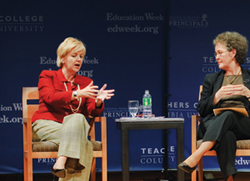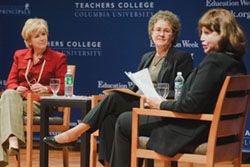Debating the Future of U.S. Education
Darling-Hammond, a former TC faculty member and the Charles E. Ducommun Professor of Education at
“Right now, we don’t have the capacity to ensure that everyone gets what is really the new civil right—access to a high-quality education,” Darling-Hammond said. “That is going to require equalization of resources, and it is going to require investments. When people—particularly rich people—say that money doesn’t matter, I don’t see them trying to give it up.” She added that the
But Keegan said that “there is just not one single credible study now that says what we really need to do in the
Keegan said McCain wants the country to “sit down, make some tough decisions. Are we in our own way? Do we have barriers that are keeping us from having the best teachers in the most needy classrooms? Why is this not happening in the presence of the resources we do have?”
The two speakers disagreed on a range of other issues. Keegan said McCain “would absolutely lift any caps on the ability of states” to create new charter schools, and that, unlike Obama, he “does not want to get into the business of saying to states what an effective charter school program is.”
Darling-Hammond said Obama “wants to see that failing charters are closed while successful charters are enabled to move forward.
“Choice isn’t worth much if all it does is move around the deck chairs on the Titanic,” she said.
Darling-Hammond assailed aspects of the federal No Child Left Behind Act, saying, “We need to be able to look at measures that, in addition to the kinds of standardized tests we currently have, evaluate 21st century skills.” She said that the assessments of academically top-performing countries “include relatively few multiple-choice items and, in some cases, none. Kids are doing science inquiries, research papers, technology products.”
Keegan said McCain was “absolutely adamant that state standards and the assessments for kids that are in place have got to stay in place,” adding that “the problem with backing off of assessments and turning them into portfolios [compendia of students’ work over time] or things that are more subjective is that we can’t compare kids.”
And where Darling-Hammond extolled the value of pre-K education, saying that “the early childhood research base is really clear that high-quality preschool has strong and lasting benefits for students throughout school,” Keegan countered that “if that were true, then by now we should have a lot more progress in elementary, middle and high school. Senator McCain is saying, look, we have got to talk about the quality of these programs.”
Ultimately, about the only thing the speakers agreed on was Fuhrman’s observation that “too little has been said about education in the presidential campaign”—and for that, both blamed the media.
Archived video of the TC debate, “Education and the Next President,” and a full transcript can be viewed at www.edweek.org or www.tc.columbia.edu/news/6719.
Published Thursday, Jan. 15, 2009

